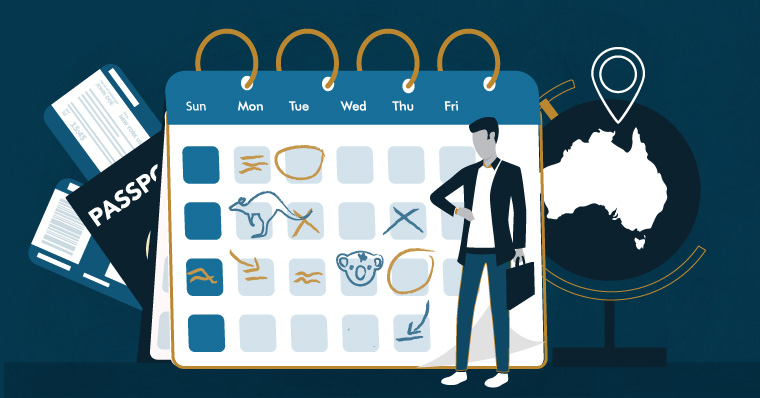Planning to live, work, study, or settle in Australia? Understanding visa processing times in Australia is crucial for smooth and stress-free migration planning. In 2025, Australia continues to welcome skilled professionals, international students, and families—but with ever-evolving immigration rules and variable processing timelines, staying informed is key.
Whether you’re applying for a student visa, skilled worker visa, or a family visa, this guide will give you the latest insights into processing durations and tips on how to speed up your application—plus how working with the best visa agent can make all the difference.
Why Understanding Visa Processing Times Matters
Visa processing times directly impact your plans. For students, a delay could mean missing intake deadlines. For workers, it might mean postponing job start dates. And for families, delays can bring emotional and financial stress.
That’s why it’s essential to not just apply early, but also be aware of the estimated processing timeframes based on your visa type and application route.
Average Visa Processing Times in Australia – 2025 Snapshot
Processing times can vary depending on the visa category, application volume, and individual circumstances such as document completeness or medical assessments.
Here’s a general overview of visa processing times in Australia in 2025:
| Visa Type | 75% of Applications Processed Within | 90% of Applications Processed Within |
|---|---|---|
| Student Visa | 4 weeks | 6 weeks |
| Temporary Graduate Visa (Subclass 485) | 6 months | 7 months |
| Skilled Independent Visa (Subclass 189) | 5 months | 8 months |
| Skilled Nominated Visa (Subclass 190) | 6 months | 9 months |
| Partner Visa | 10–20 months | 18–26 months |
| Visitor Visa | 2 weeks | 3–4 weeks |
| Employer Sponsored Visa (Subclass 482) | 5–8 weeks | 9–11 weeks |
Note: These are approximate timeframes based on current data and may change due to policy updates or case backlogs.
Factors That Affect Visa Processing Times
Visa processing is not just a matter of timelines—it’s influenced by several variables:
1. Type of Visa
Permanent visas usually take longer due to background checks and higher scrutiny, while temporary visas may be processed quicker.
2. Lodgement Method
Online applications are usually processed faster than paper submissions.
3. Completeness of Documents
Missing information or unclear documents can lead to delays, or even refusals.
4. Health & Character Checks
If your case requires additional checks (such as health exams or police clearance), expect longer timelines.
5. Volume of Applications
Processing times fluctuate depending on how many applications are in queue—especially during peak intake seasons.
How to Speed Up Your Visa Application
While you can’t control every aspect of visa processing, there are ways to help move things along:
✅ Submit a Decision-Ready Application
Ensure your application is complete with all required documentation, including health checks, English test results, and financial proof.
✅ Apply Early
Especially for student and skilled visas, applying at least 3–4 months in advance is recommended.
✅ Use the Best Visa Agent
Experienced agents can spot red flags in your application and advise on visa-specific strategies that improve approval chances.
Why Work with the Best Visa Agent?
Choosing the best visa agent isn’t just about paperwork—it’s about peace of mind. A registered and reliable migration agent can:
- Help you select the most appropriate visa
- Ensure accurate, error-free submissions
- Monitor your application status and respond to immigration requests
- Save you time and reduce risk of refusals or delays
Whether you’re applying for the first time or handling a complex case, an expert can turn a stressful process into a streamlined journey.
Pro Tip: Always verify that your visa agent is registered with the Migration Agents Registration Authority (MARA).
How to Track Your Visa Application
The Australian Department of Home Affairs provides tracking tools for most visas. After lodging your application, you’ll receive an ImmiAccount login to check the status in real-time.
While there’s no way to “fast-track” most visas, you can contact the Department for urgent processing under special circumstances—though this is rarely approved unless there’s a compelling reason.
What to Do While You Wait
While your visa is being processed, you can prepare for life in Australia:
- Arrange accommodation
- Book travel (with flexible dates)
- Plan your finances
- Complete any required medical exams or biometrics
- Stay in regular contact with your agent or consultant
Final Thoughts: Plan Smart, Apply Early
Understanding visa processing times in Australia is more important than ever in 2025. Delays can be frustrating, but with the right planning and guidance, your visa journey can be smooth and successful.
Working with the best visa agent ensures you’re not navigating it alone. Whether you’re pursuing education, employment, or permanent residency, having an expert by your side can turn uncertainty into confidence.

